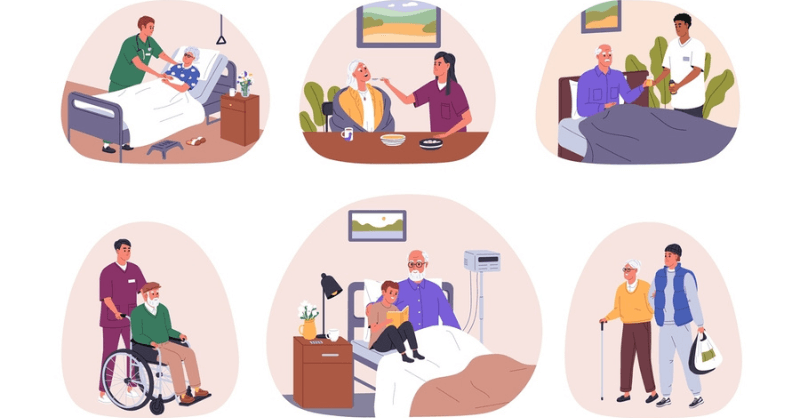Caring for the elderly is a rewarding and essential role, especially as more families choose in-home care over institutional facilities. Jobs taking care of elderly in their home provide companionship, assistance with daily tasks, and specialized care, allowing seniors to maintain their independence and dignity. Join CareerFind247 to explore this job and help you know what skills you should prepare!
1. Introduction

1.1 What is jobs taking care of elderly in their home?
Elderly care jobs involve assisting seniors with activities of daily living, providing healthcare, and offering companionship within the comfort of their homes. These roles cater to aging individuals who prefer staying in familiar surroundings rather than moving to nursing facilities. They play a vital role in ensuring that seniors maintain their dignity, independence, and quality of life during their later years.
1.2 Growing Demand for Elderly Care Jobs
The demand for elderly care jobs is increasing globally, fueled by an aging population and a growing preference for in-home care. Families are seeking caregivers who can provide personalized and compassionate care to their loved ones, making this field one of the fastest-growing in the healthcare sector.
2. Jobs Taking care of Elderly in Their Home

2.1 Companion Caregiver
Companion caregivers focus on emotional support and social interaction. They may assist with light chores, accompany seniors to appointments, or simply provide companionship to combat loneliness.
2.2 Personal Care Assistant (PCA)
PCAs handle more intimate aspects of care, such as bathing, dressing, grooming, and mobility support. This role requires a high degree of empathy and trust as it involves close personal interaction.
2.3 Home Health Aide (HHA)
Home health aides provide medical-related care, including medication reminders, monitoring vital signs, and assisting with basic wound care. This role often requires specific training or certifications.
2.4 Live-In Caregiver
Live-in caregivers offer around-the-clock assistance, staying with seniors in their homes. This arrangement typically includes meals and accommodation as part of the compensation package, along with a salary.
2.5 Specialized Elderly Caregiver
These caregivers focus on individuals with specific conditions, such as dementia, Parkinson’s disease, or Alzheimer’s. Specialized training in managing these illnesses is often required, as the role involves both medical and emotional support.
3. Skills Required for Elderly Care Jobs

3.1 Interpersonal Skills
Empathy, patience, and effective communication are essential to building trust and providing emotional support.
3.2 Physical Strength and Stamina
Caregivers often assist with lifting or transferring seniors, which requires physical fitness and endurance.
3.3 Medical Knowledge
Basic first aid and CPR skills are vital for handling emergencies. Understanding common elderly health issues such as arthritis, diabetes, or heart conditions is also crucial.
3.4 Problem-Solving Skills
Quick thinking and adaptability are necessary for managing unexpected situations, such as a fall or medical emergency.
3.5 Time Management
Caregivers must efficiently balance caregiving tasks with administrative duties, such as record-keeping or coordinating with family members.
4. Experience and Qualifications Needed

4.1 Formal Education Requirements
Entry-level roles may require only a high school diploma. Advanced positions, like home health aides, often need certifications such as a Certified Nursing Assistant (CNA) or Home Health Aide (HHA) license.
4.2 Relevant Experience
Previous experience, either professional or volunteer, working with seniors is highly valued. This could include caregiving for a family member or volunteering at a senior center.
4.3 Background Checks and References
Employers typically require a clean background check and strong references to ensure trustworthiness and reliability.
5. Where to Find Elderly Care Jobs

5.1 Online Job Platforms
Websites like Care.com, Indeed, and ElderCare.com specialize in connecting caregivers with families in need.
5.2 Local Agencies
Home care agencies and non-profits often have openings for caregivers. These organizations provide training and match caregivers with clients based on skills and preferences.
5.3 Networking and Community Outreach
Connecting with local communities, faith-based organizations, or attending caregiving workshops can help uncover job opportunities.
6. Benefits and Challenges of Elderly Care Jobs

6.1 Benefits
- Fulfilling Work: Making a positive impact on someone’s life can be deeply rewarding.
- Flexible Schedules: Many caregiving roles offer part-time or flexible hours.
- Career Growth: Opportunities for advancement into specialized caregiving or management roles.
6.2 Challenges
- Physical and Emotional Demands: Assisting with daily tasks and handling emotional needs can be taxing.
- Handling Emergencies: Caregivers must stay calm and act quickly during medical or safety crises.
7. Tips for Excelling in Elderly Care Jobs

- Build Trust: Develop strong relationships with both seniors and their families to foster trust and cooperation.
- Stay Updated: Regularly attend training sessions to enhance skills, particularly in first aid and senior care techniques.
- Practice Self-Care: Prioritize your mental and physical well-being to prevent burnout.
- Be Adaptable: Tailor your caregiving approach to meet the unique needs of each senior.
8. Conclusion
Elderly care jobs offer a meaningful career path for compassionate individuals who value making a difference. With the right skills and mindset, these roles can be both personally and professionally rewarding. As the demand for in-home care continues to rise, now is the perfect time to explore opportunities in this growing field.
Start your journey today to provide care and companionship to those who need it most, and build a fulfilling career that truly makes an impact.
See more shares about multi-industry jobs on CareerFind247!

